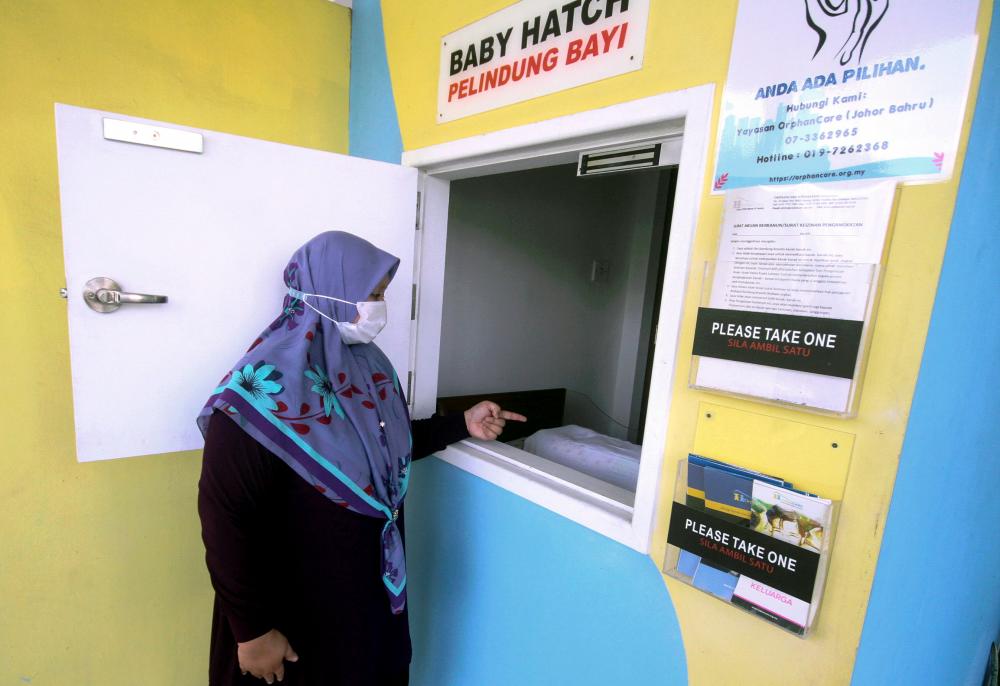PETALING JAYA: While baby hatches have played a crucial role in saving many infants from being abandoned, OrphanCare Foundation advocacy, communications and fundraising manager Riza Alwi has expressed concern over the rising number of cases.
She said last year, OrphanCare baby hatch initiatives saved 55 infants.
“However, as of early this year, from January to July, 46 babies have been rescued, bringing the total number saved since our establishment in 2009 to 604.
“This includes 106 infants placed in the hatches and 495 brought in directly by their mothers.”
Riza said the rescued infants were all under two weeks old, with some just five days old. Some arrived covered in blood with the placenta still attached while others were left with clothes and feeding bottles.
“Regardless of their condition, we always send the babies to nearby hospitals for medical assessments to ensure they receive the necessary healthcare.”
Riza said each life saved represents a small victory against the harsh realities faced by young mothers and their infants.
She said while it is uplifting to see the infants given a chance at life, they are also a reminder of the difficult circumstances and struggles that brought their mothers to OrphanCare.
She said the number of young mothers, particularly university students aged 18 to 25 who abandon their babies, is also rising.
“This is because they often lack adequate knowledge in sex education, which leads to unintended pregnancies. Some of these young mothers are victims of sexual abuse and coercion, and fear the overwhelming responsibility of raising a child.”
Riza emphasised the urgent need for comprehensive sex education programmes and robust support systems that can effectively address the challenges faced by young mothers and vulnerable populations.
She said OrphanCare baby hatch centres are open around the clock to provide support whenever needed.
“There are eight baby hatches nationwide, including three OrphanCare centres in Petaling Jaya, Johor Bahru and Sungai Petani.
“Additionally, there are five baby hatches in KPJ hospitals at Damansara in Petaling Jaya, Ipoh, Tawakal Kuala Lumpur, Seremban and AnNur Specialist Hospital in Bangi.”
Riza also said Petaling Jaya has seen an increasing number of mothers using baby hatches and consulting with OrphanCare.
She also acknowledged that some mothers are reluctant to use the hatches due to the public nature of hospitals.
“They have constant security surveillance and visitor supervision, which dissuades some mothers from using the hatches placed there.”
However, Riza stressed the critical importance of hospitals, especially government ones, in providing baby hatches to support vulnerable mothers and ensure the safety and well-being of newborns.
“These facilities need to offer accessible and confidential options such as baby hatches, which can help prevent them being abandoned in unsafe conditions as well as provide timely medical care and support.”
Riza said while OrphanCare works with various hospitals and organisations to provide comprehensive care and support for infants, its baby hatch programme faces challenges such as limited capacity and the constant need for public awareness and support.
OrphanCare also promotes public education and maintains transparent operations to address criticisms and boost awareness.
“We understand the concerns and are committed to educating the public about our efforts.
“Our programmes cover reproductive health, contraception and sex education, often in collaboration with universities, and aim to reduce the number of unwanted pregnancies.”









